I have partnered with Aimpoint Research to investigate how mindsets might differ across different demographic profiles, including political affiliation, income level, gender, education level, generation, geographic region (in the United States).
In this article, I am presenting the results of these findings.
For context, our sample was designed to reflect the United States population at large. We ended with a sample of 587.
What I am presenting to you is the average mindset scores across different demographic profiles.
(If you are interested in completing my Personal Mindset Assessment, you can take it here: FREE Personal Mindset Assessment.)
What You Will Find Below
Here is a list of the different sets of findings generated from this research. Clicking on these items will automatically take you to those particular findings.
• Mindsets by Political Affiliation
• Mindsets by U.S. Region
• Mindsets across Generations
• Mindsets across Ethnicities
• Mindsets across Marital Status
• Mindsets across Income Levels
• Mindsets across Education Levels
• Mindsets across Organizational Hierarchy
• Mindsets across Mental State Quality
Mindsets by Political Affiliation
Here are the results:
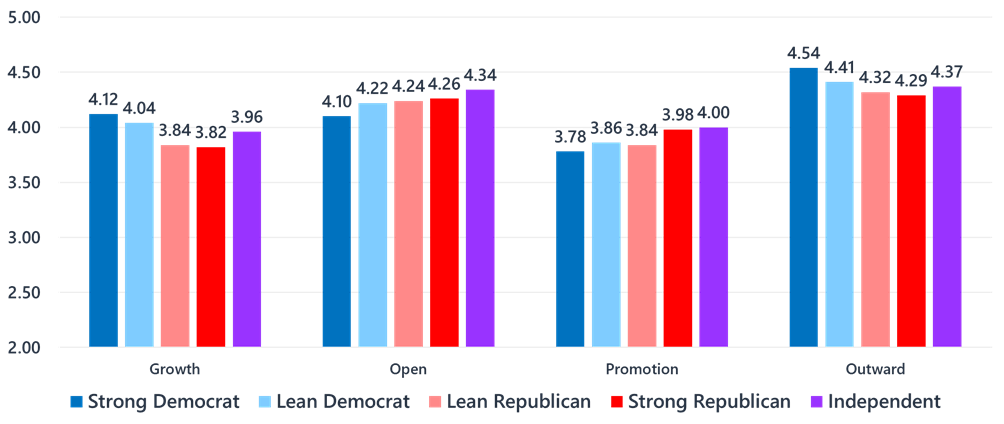
At a high-level:
- There seems to be a pretty predictable trend either up or down as you go from Strong Democrat to Strong Republican
- Independents appear to be the group that is the most open-minded and most-promotion minded, but they fall in the middle of the pack for growth and outward mindsets
When it comes to the comparison between democrats and republicans:
- Democrats appear to be more growth-minded than republicans. This suggests that democrats are more likely to believe that people can change their talents, abilities, and intelligence, which makes them more focused on learning and growing than on looking good.
- Republicans appear to be more open-minded than democrats. This suggests that republicans are more likely to be willing to seek out new information that will help them to think more optimally. Stated differently, republicans seem to be more focused on thinking optimally, while democrats seem to be more focused on being right.
- Republicans appear to be more promotion-minded than democrats. This suggests that republicans are more focused on reaching goals and creating solutions, whereas democrats are more focused on avoiding problems and making sure things don’t go wrong.
- Democrats appear to be more outward-minded than republicans. This suggests that democrats are more likely to see others as being people and want to lift them; whereas republicans are more likely to want to get ahead, and as a result, more likely to see others as objects.
Mindsets by U.S. Region
Here are the results:
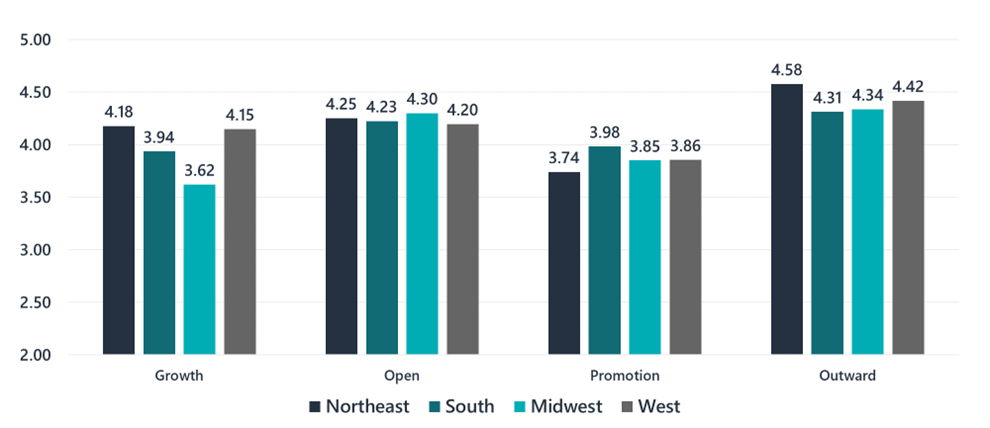
At a high-level:
- There does seem to be differences in mindsets across U.S. regions, but not in any predictable way.
- There wasn’t much difference across regions for Open Mindset, but there are large differences across regions for Growth Mindset.
Specific Findings:
- Fixed to Growth Mindsets. Those in the Midwest, on average, have the most fixed mindsets, followed by those in the South. This means that they seem to be more focused on looking good and avoiding failure). Those in the Northeast and West have the most growth mindsets, which means that they seem to be more focused on learning and growing.
- Closed to Open Mindsets. There weren’t large differences across regions, but the data points toward the Midwest being the most open-minded and the West being the most close-minded.
- Prevention to Promotion Mindsets. Those in the Northeast, on average, have the most prevention mindsets. This means that they seem to be the most focused on avoiding problems (as opposed to reaching goals). Those in the South have the most promotion mindsets, which means that they seem to be the most focused on reaching goals (as opposed to avoiding problems).
- Inward to Outward Mindsets. Those in the South and the Midwest appear to have the most inward mindsets. This means that they are more inclined to see others as objects (as opposed to people). Those in the Northeast seem to have the most outward mindsets, which means that they are more inclined to see others as people (as opposed to objects).
Mindsets across Generations
Here are the results:
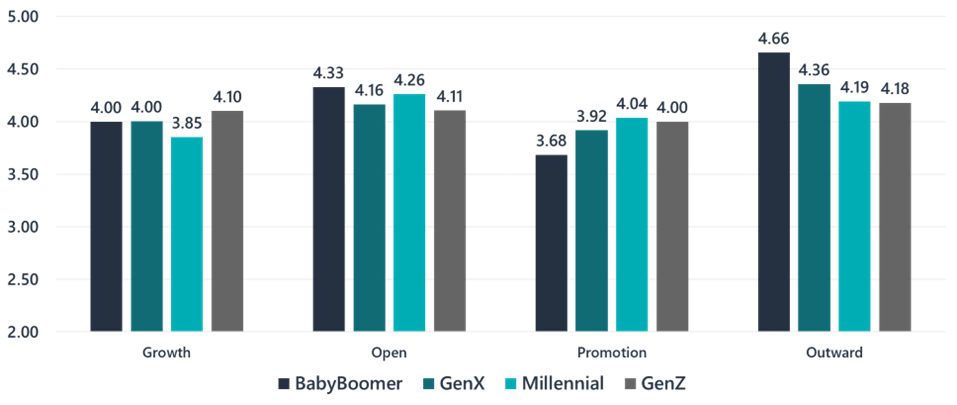
Key Findings:
- Fixed to Growth Mindsets. Surprising to me is that there is a rather large difference between Millennials and Gen Zers. Millennials have more fixed mindsets (seem to be more focused on looking good and avoiding failure), while Gen Zers have more growth mindsets (seem to be more focused on learning and growing).
- Closed to Open Mindsets. The most open-minded group was Baby Boomers, with Millennials in a close second. This means that they are more focused on finding truth and thinking optimally. And, while Gen Zers have a stronger growth mindset, they seem to be the most close-minded (more focused on being right).
- Prevention to Promotion Mindsets. While Millennials are the most fixed-minded, they are also the most promotion-minded (slight margin ahead of Gen Zers), which means that they are more focused on winning and gains (i.e., more purpose-focused). Baby Boomers are the most prevention-minded, which means that they are more focused on avoiding problems (i.e., more comfort-focused). This might be one reason why Millennials and Gen Zers may rub Baby Boomers the wrong way.
- Inward to Outward Mindsets. The findings here confirm some of my previous research on mindsets by age, where there is a positive correlation between age and outward mindset (i.e., the older you get, the more you become outward-minded). Baby Boomers are substantially more outward-minded (see others as people and value them as such) than Millennials and Gen Zers, who are more inclined to see others more as objects. Again, another reason why Millennials and Gen Zers may rub Baby Boomers the wrong way.
Mindsets across Ethnicities
Here are the results:
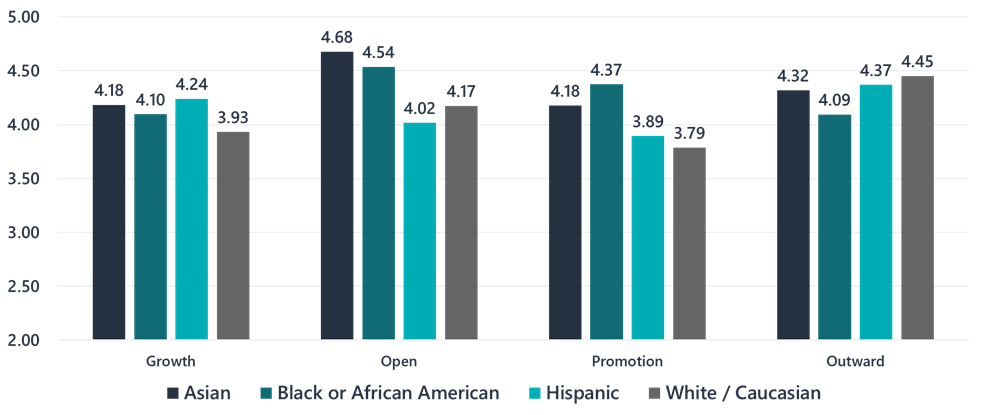
Key Findings:
- Fixed to Growth Mindsets. Those who identify as White/Caucasian have, by far, the most fixed mindsets. This means that collectively, they are more focused on looking good and avoiding failure, while the other ethnicities are comparatively more focused on learning and growing.
- Closed to Open Mindsets. Those who identify as Asian and Black/African American are substantially more open-minded than those who identify as Hispanic or White/Caucasian. This means that those who identify as Asian and Black/African American are more focused on finding truth and thinking optimally, and less focused on being right than those who identify as Hispanic or White/Caucasian.
- Prevention to Promotion Mindsets. Those who identify as Black/African American are the most promotion-minded. This means that they are more focused on reaching goals than avoiding problems compared to the other ethnicities. On the low side, those who identify as White/Caucasian are the most prevention-minded. This means that they are more focused on avoiding problems (as opposed to being focused on reaching goals) than the other ethnicities.
- Inward to Outward Mindsets. Those who identify as Black/African American have the most inward mindsets. This means that they are more inclined to see others more as objects than as people. The implications of this finding should not be lost on us. I imagine it is a product of past wrongs and injustices. And, I believe it should be seen as a signal that greater healing needs to occur in our collective national culture. And, based upon the results, perhaps Whites/Caucasians have the mindsets best suited to lead out in this effort.
Mindsets across Marital Status
Here are the results:
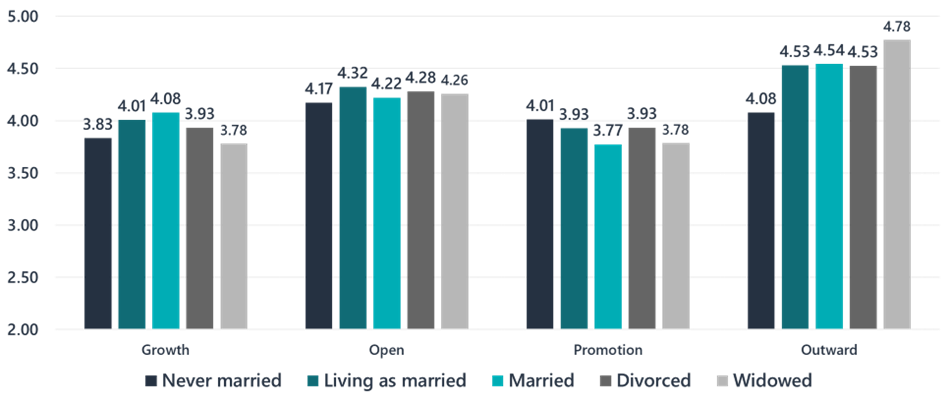
Big Picture Findings:
- It appears that losing a spouse is traumatic. It causes someone to focus more on avoiding failure and problems, likely as a form of self-protection. But, it seems to make them significantly more empathetic compared to others who have not lost a spouse.
- Never Married. Overall, those who have never married have the most negative and self-focused mindsets. The exception to this is that they are the most promotion-minded. This is possibly because they have less familial responsibilities, which helps them to be more goal-oriented and more willing to take risk than others who may have more familial responsibilities.
- It appears that being married has some pros and cons when it comes to mindsets. A pro is that they seem to be the most growth-minded. Perhaps this is because they have the love and backing of family members that they can focus more on learning and growing and less on protecting their image. A con is that they seem to be the most prevention-minded. They are the least goal-oriented and the least willing to take risks, possibly because they have the most familial responsibilities. They are middle-of-the-road for open and outward mindsets.
Key Mindset Findings:
- Fixed to Growth Mindsets. Those who are married have the strongest growth mindsets. This means that they are more focused on learning and growing than on looking good and avoiding failure. Those who are widowed and never married are the least growth-minded. This means that they are more focused on looking good and avoiding failure than those with a different marital status.
- Closed to Open Mindsets. For the most part, there isn’t large differences in the open-mindedness of people across different marriage status. But, the most open-minded group are those living as married, while the least open-minded group are those who have never married.
- Prevention to Promotion Mindsets. Those who have never married are the most promotion-minded. This means that they are the most focused on achievement and reaching goals. The groups who are the most prevention-minded are those who are married and widowed. This means that they are the most focused on avoiding problems and limiting risk.
- Inward to Outward Mindsets. Those who are widowed are far and away the most outward-minded. This means that they are much more inclined to see and value others as people. Those who have never married are far and away the most inward-minded. This means that they are much more inclined to see others as objects, and value them as such.
Mindsets across Income Levels
Here are the results:
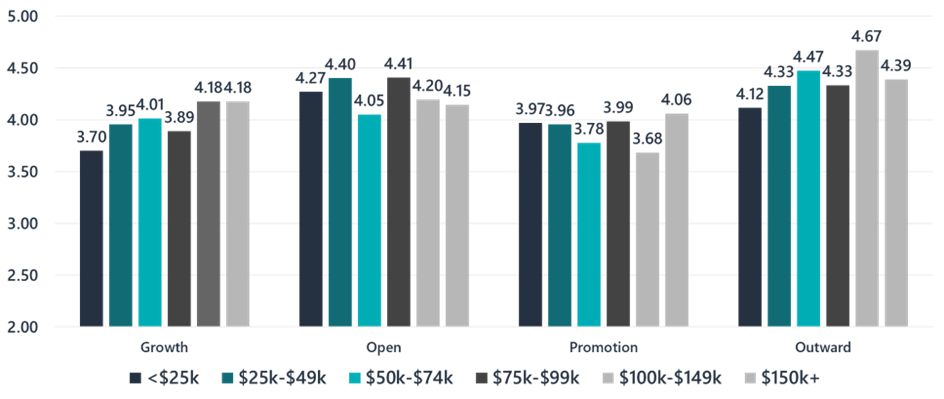
Big Picture Findings:
- Growth Mindset. There seems to be a relationship between income level and growth mindset. The most growth-minded people are at the highest income levels. And, the most fixed-minded people are those who are at the lowest income level.
- Open Mindset. People at the highest income levels are among the most closed-minded.
- Promotion Mindset. I find it really interesting that the most prevention-minded group is those that make between $100k-$149k. The most promotion-minded group (by a slim margin) are those in the highest income bracket (maybe for a reason).
- Outward Mindset. I find it interesting that the most outward-minded group are those that make between $100k-$149k. I expected those in the top income bracket to be the most outward. The most inward-minded are those in the lowest income bracket (probably because they are in self-protection mode).
Mindsets across Education Levels
Here are the results:
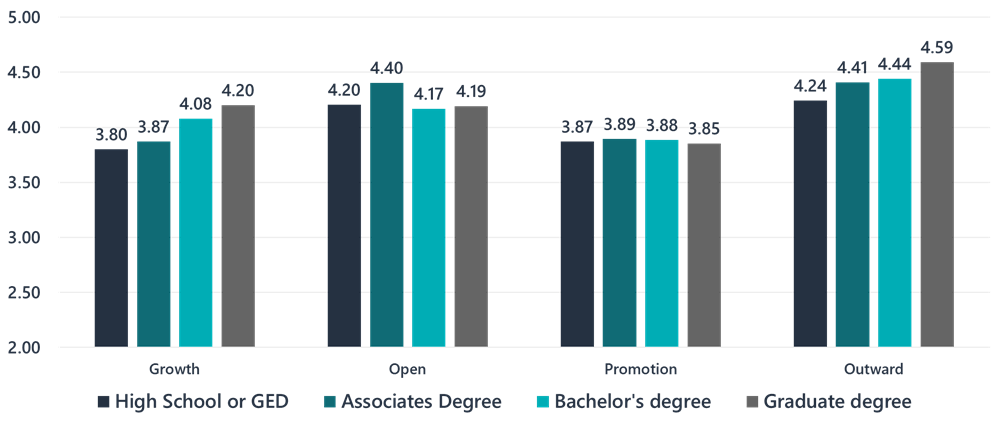
Big Picture Findings:
- Growth Mindset. There seems to be a relationship between education level and growth mindset. The greater the education, the more growth-minded people are. What is interesting to me is how much of a difference there is between those with a Bachelor’s degree and those with a graduate degree.
- Open Mindset. There doesn’t seem to be a relationship between education level and open mindsets, but those with an Associate’s degree stand out as the most open-minded.
- Promotion Mindset. There is no difference in level of promotion mindset across the education levels. Everyone, regardless of education level, seems to be rather risk-adverse.
- Outward Mindset. There seems to be a relationship between education level and outward mindset. The greater the education, the more outward-minded people are. Again, what is interesting to me is how much of a difference there is between those with a Bachelor’s degree and those with a graduate degree.
Mindsets across Organizational Hierarchy
Here are the results:
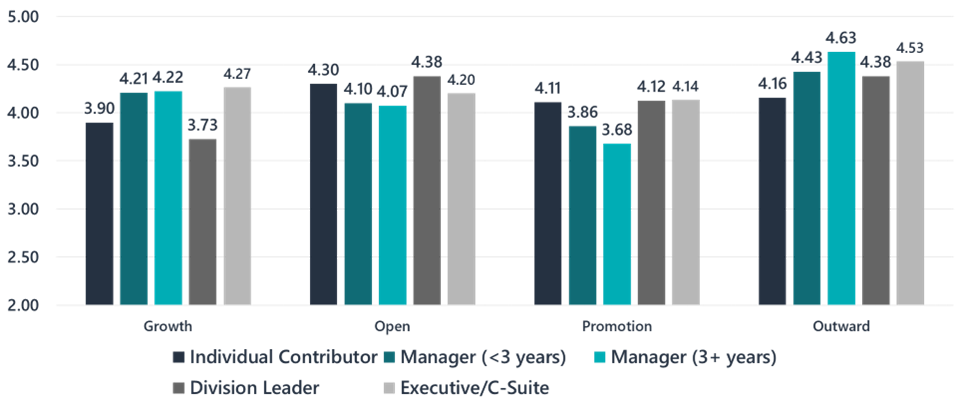
Big Picture Findings:
- Growth Mindset. The group with the most growth mindsets is the Executive/C-Suite group. But, interestingly, the group with the least growth mindsets is the level just below the Executive/C-Suite group: Division Leader group. One way to interpret this is that the Division Leader group is the most focused on avoiding failure and looking good. Because of that, they are most inclined to avoid challenges and to only do the things that they know they can be successful with. They seem to be a group that is not very future-ready.
- Open Mindset. While Division Leaders are the most fixed-minded, they are the most open-minded. The groups that are the least open-minded are the two Manager groups.
- Promotion Mindset. The two Manager groups are also the least promotion-minded. This means that they are more focused on avoiding problems than on reaching goals. This might be understandable/justifiable, but it is going to prevent engagement and effectiveness of employees. Interestingly, the more-experienced Managers are less promotion-minded than the less-experienced Managers.
- Outward Mindset. It doesn’t shock me to see that the group with the least outward mindsets is the Individual Contributor group. But, it is a little surprising to see the experienced managers as being the most outward-minded.
If I am someone focused on developing the employees in my organization, here is what I would prioritize given these findings:
- Help Division Leaders to become more future-ready by helping them develop more of a growth mindset. This will also improve the organization’s overall leadership pipeline.
- Help Managers be more engaging and psychologically safe by helping them develop more open and promotion mindsets.
- Help Individual Contributors focus less on not failing (low growth mindset) and less on themselves (inward mindset). Not only will they operate more effectively in their roles, but you will help prepare them to manage if that is part of their desires.
Mindsets across Mental State Quality
Happiness
Findings:
- There seems to be a pretty clear and strong relationship between happiness level and growth mindset, such that those that are happier are more growth-minded.
- Those that are the least happy, are the most close-minded.
- Happiness doesn’t seem to play a role in how promotion-minded someone is.
- Those that are least happy are the most inward-minded.
Anxiety
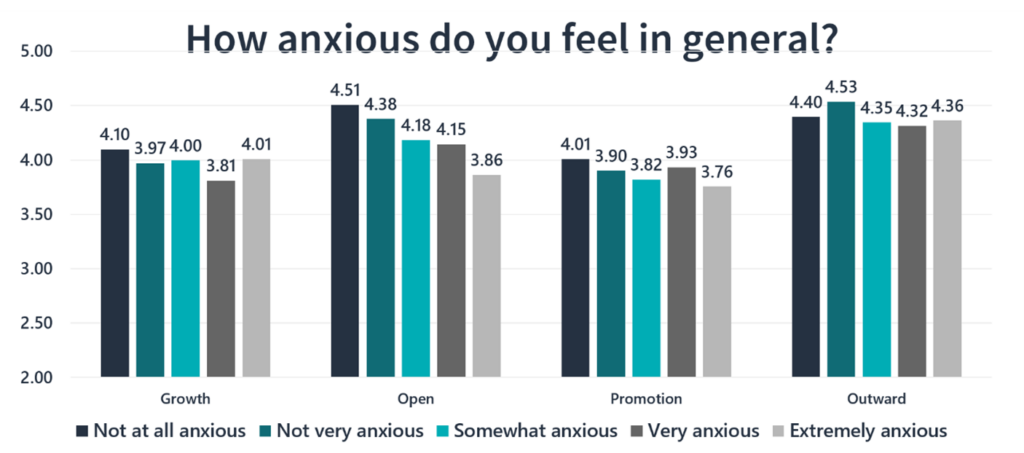
Findings:
- One’s anxiety level doesn’t seem to have much of a bearing on one’s growth-mindedness, although the group that is the most growth-minded has the least anxiety.
- There seems to be a pretty clear and strong relationship between anxiety level and open-mindedness, such that those with less anxiety are more open-minded.
- One’s anxiety level doesn’t seem to have much of a bearing on one’s promotion-mindedness, although the group that is the most promotion-minded has the least anxiety.
One’s anxiety level doesn’t seem to have much of a bearing on one’s outward-mindedness.
What You Do is Worthwhile
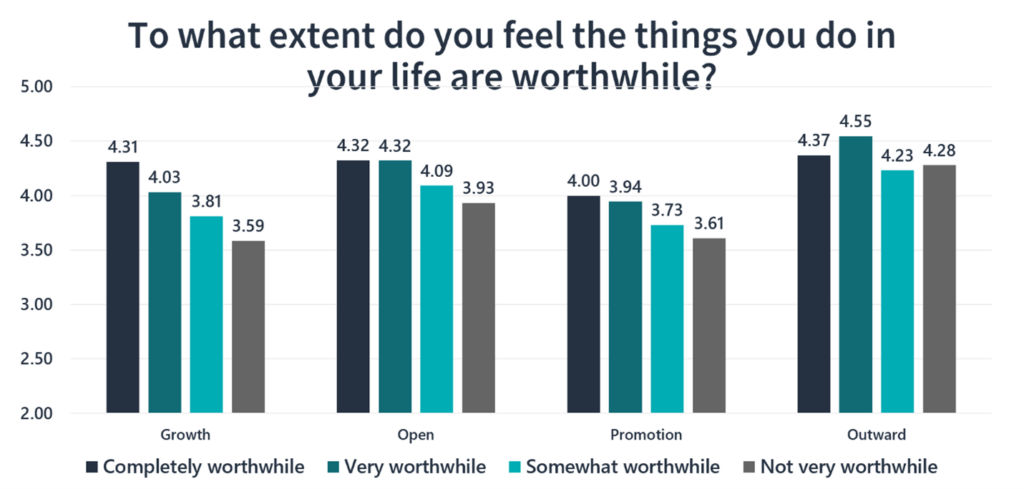
Findings:
Something to keep in mind about these findings is that the group that answered “Not at all worthwhile” is rather small, which I think is skewing
- There seems to be a pretty clear and strong relationship between feelings of worth and growth mindset, such that those that feel they are doing things that are worthwhile are more growth-minded.
- There seems to be a pretty clear and strong relationship between feelings of worth and open mindset, such that those that feel they are doing things that are worthwhile are more open-minded.
- There seems to be a pretty clear relationship between feelings of worth and promotion mindset, such that those that feel they are doing things that are worthwhile are more promotion-minded.
- There seems to be a trend point toward those that feel they are doing things that are worthwhile are more outward-minded.
Conclusion
I believe that these results largely confirm the not-so-far-fetched idea that there is a connection between mindsets and mental states.
What is interesting to me is that, of the aspects of well-being that we measured, the one that seems to be most consistently related to all four sets of mindsets is a feeling that one is doing things with their life that are worthwhile.
I would like to believe that when we are focused on doing things that make our lives feel worthwhile, we develop more positive mindsets because it is only by taking on the positive mindsets that we will be able to accomplish those worthwhile things.


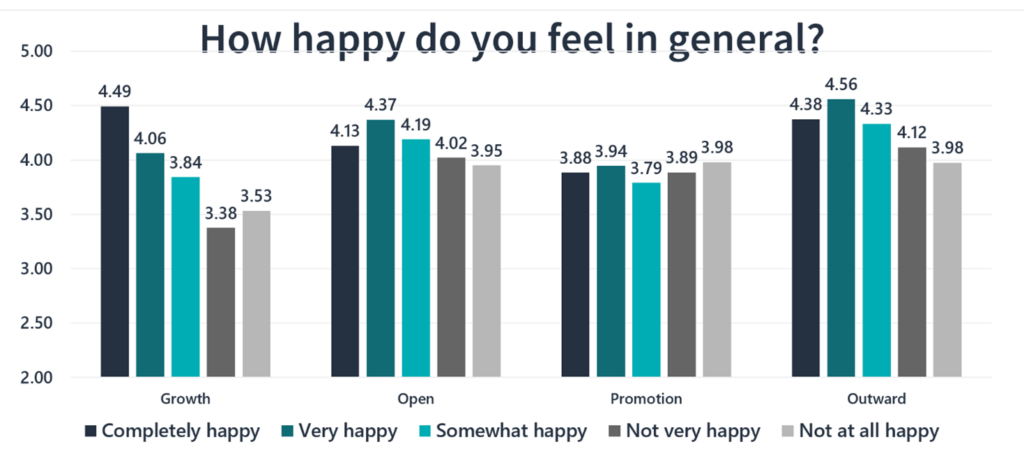









One Response
The examination of mindset study findings by Ryan Gottfredson brings back memories of a difficult assignment I oversaw at work. I had a fixed attitude when I first started, thinking that I couldn’t accomplish anything. But after finishing Carol Dweck’s book “Mindset,” I understood the importance of having a growth mindset. I started to rise to obstacles, grow from failures, and eventually finish the job. It’s incredible what a change of perspective can do. See the books that Echelon Front recommends reading for further insights: https://echelonfront.com/books/.